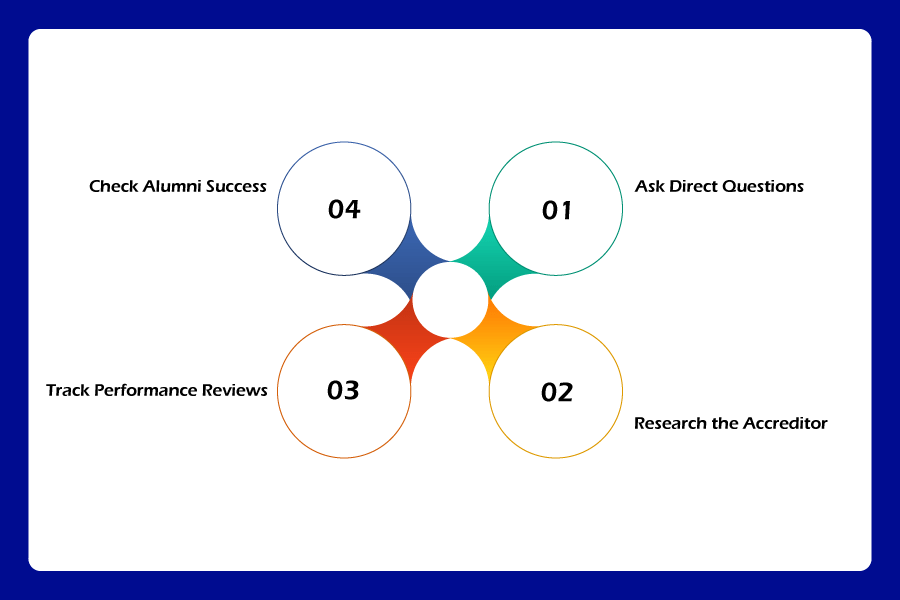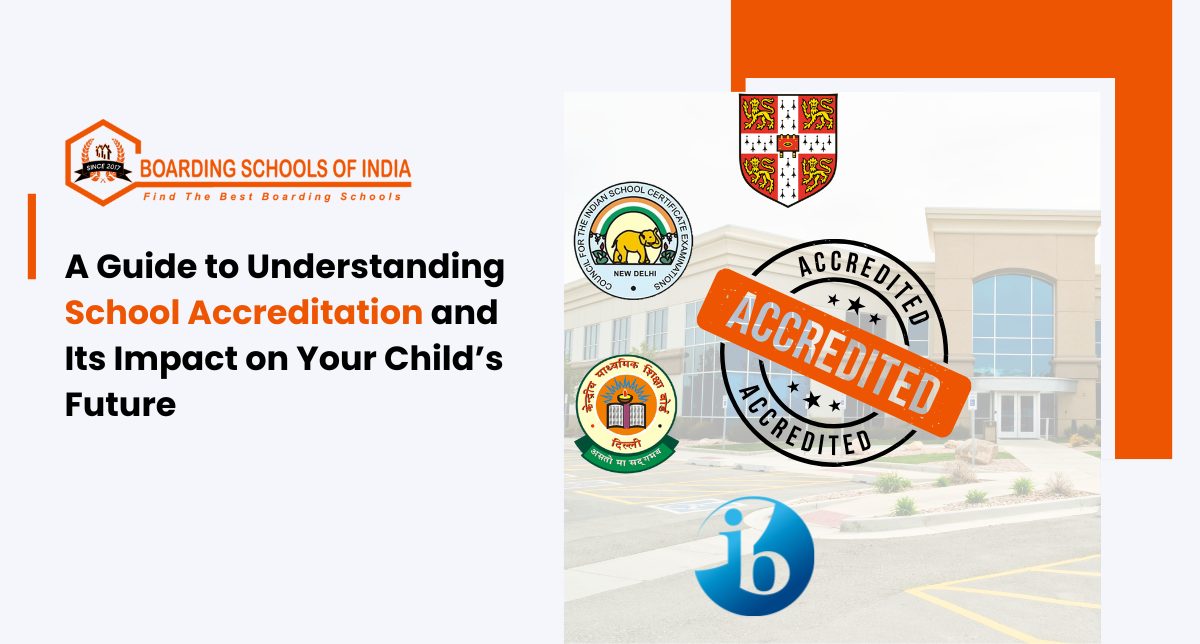“Out of approximately 1.5 million schools in India, just 7,000 have obtained accreditation, amounting to only 0.5% of all schools”, says Hindustan Times Report.
One of the most delicate decisions that parents make for their child is choosing the right school. However, with the world full of scams, it is challenging to determine or trust new options; in some cases, even established schools with a good reputation are difficult to evaluate. The reason is not only sophisticated prospectuses and eye-fascinating campus tours, but also one of the crucial factors: their accreditation.
School accreditation is one of the crucial factors that define the educational quality and credibility of a school. This blog is your guide to understanding the school’s accreditation and how it can shape your child’s future.
Table of Contents
- What Is School Accreditation?
- Why Is Accreditation Important?
- How Does Accreditation in India Work
- What Makes It Essential To Choose An Accredited Boarding School?
- What Should Parents Look For?
- Accreditation and Private Schools
- Accreditation for Technical and Vocational Schools
- The Future of Accreditation
- Final Thoughts
- Frequently Asked Questions
What Is School Accreditation?
School accreditation is a standard recognition that an institution meets specific standards of quality and performance. This validation is offered by an external accrediting body, national or international, which rigorously evaluates everything from curriculum and faculty to infrastructure and ethics.
There are different types of accreditation: national, regional, and international. For example, private school accreditation in India might be governed by organizations like CISCE (Council for the Indian School Certificate Examinations) or CBSE (Central Board of Secondary Education). Meanwhile, global schools often seek validation from international bodies like CIS (Council of International Schools) or IB (International Baccalaureate).
High-quality accreditation for schools provides assurance that your child is receiving education that is not only recognized but also respected worldwide.
Why Is Accreditation Important?

School accreditation is primarily the most significant factor that works as a quality stamp for schools. Multiple schools operate with inferior standards, leaving students at a professional and academic disadvantage. However, accredited schools undergo regular reviews, update their teaching approaches, and stay aligned with modern pedagogical trends.
But the significance doesn’t end there. High school accreditation impacts:
- College Admissions: During admission into a university, countries, especially like U.S. and Europe, often ensure whether the applicant’s high school is accredited or not. If your child holds a degree from an unaccredited institution, it might risk their college admission.
- Scholarships and Grants: Accredited institutions are more likely to be eligible for educational grants and scholarships.
- Global Recognition: Whether your child moves abroad or applies to international internships, a certificate from an accredited school carries massive value.
According to the National Assessment and Accreditation Council (NAAC), accredited schools in India report higher student performance and better academic outcomes.
How Does Accreditation in India Work
Where India’s school accreditation framework is still evolving, most schools still do not maintain transparent quality systems. While the top-tier ICSE board schools and CBSE board schools ensure immaculate accreditation, many private schools are not recognized or obliged to accreditation standards.
This makes it essential for parents to have a clear understanding of boarding school accreditations. Whether you are considering boarding schools in India or city-based institutions, always ensure to check school accreditation by visiting their official website of CBSE, CISCE or state boards.
Some credible platforms to verify include:
- CISCE official site
- CBSE Affiliation Directory
- International Baccalaureate (IB Board)
In addition, global affiliations such as Cambridge Assessment International Education (Cambridge Board) and Edexcel can add credibility to an Indian school’s curriculum.
What Makes It Essential To Choose An Accredited Boarding School?
When it comes to boarding schools in India, accreditation becomes even more important. These schools are often chosen not just for academics, but for holistic development, sports, arts, leadership, and character-building. However, not all residential schools offer the same standards.
Choosing an accredited technical school or the best boarding school means you’re signing up for an ecosystem designed to support long-term student success. Accredited boarding schools offer well-rounded curricula, skilled faculty, and above all, consistency in quality assurance.
According to a recent survey by EducationWorld India, most students from accredited boarding schools pursued global careers within five years of graduation.
This data alone highlights how private school accreditation can become a game-changer for future opportunities. But what should parents primarily look for while ticking off the accreditation parameters? Let’s discuss
What Should Parents Look For?

When researching schools, many parents focus on infrastructure or extracurriculars. While these are essential, accreditation should be your priority filter. Here’s how to go about it:
Ask Direct Questions
Don’t hesitate to ask the school about its accrediting bodies. Ask for official documents or certificates.
Research the Accreditor
Some schools might claim to be “accredited” by fraudulent or unrecognized entities. A little online research can reveal the credibility of the accrediting organization.
Track Performance Reviews
Accredited schools typically undergo regular audits. Ask for performance summaries or review reports.
Check Alumni Success
The quality of graduates, their higher education pathways, and professional placements are strong indicators of a school’s credibility.
Accreditation and Private Schools
India has witnessed a surge in private education over the last two decades. With this boom, the need for accreditation for private schools has become crucial. Unlike government-run schools, private institutions are not automatically brought under strict regulation, making private school accreditation essential.
Parents should be cautious! Just because a school charges premium fees or boasts of international collaborations doesn’t guarantee quality. Hence, always check school accreditation before making any decisions, as even a well-structured curriculum can fall short without formal quality assurance.
Accreditation for Technical and Vocational Schools
Not every student follows a conventional academic path. For those inclined towards unique career preferences, accredited technical schools offer an incredible alternative. But again, accreditation remains key. A certification from a non-recognized technical school can become a hurdle rather than a stepping stone.
When exploring vocational paths, always verify if the institution is recognized by national skill councils or technical education boards such as AICTE or NSDC.
The Future of Accreditation
The landscape of education is shifting at a rapid pace. With the advent of hybrid learning, online platforms, and international collaborations, school accreditation is becoming more dynamic. Hence, it is essential for parents to remain aware of these transformations in the academic industry.
India’s National Education Policy (NEP) 2020 also emphasizes quality assurance and proposes setting up independent bodies to improve accreditation for schools nationwide. As these reforms take place, we can hope for greater transparency and better educational standards across the board.
Final Thoughts
Where the educational journey of a student has multiple milestones, accreditation remains one of the foundational pillars. Whether you’re choosing a local CBSE board school, an elite ICSE board school, or one of the best boarding schools in India, never compromise on accreditation.
It depicts the school’s commitment to excellence and is a predictor of your child’s future success. Hence, always before enrollment, check school accreditation thoroughly and seek expert advice.
If you’re looking for verified, high-ranking boarding institutions with a reputation for academic excellence and holistic growth, visit Boarding Schools of India. This trusted platform offers a comprehensive list of the top boarding schools of India, including their accreditation details, curriculum highlights, and admission processes. Moreover, for personalized suggestions or admission queries, connect with the admission experts at the Boarding Schools of India for free.
Explore more Blogs: https://blog.boardingschoolsofindia.com/
Frequently Asked Questions
How can I verify if a school is properly accredited?
You can verify a school’s accreditation by checking with the official website of the accrediting board, such as CBSE, CISCE, IB, or state education departments. For international accreditation, organizations like the Council of International Schools (CIS) or Cambridge International provide searchable school directories. Always ask the school directly for accreditation proof and cross-check it online.
How does school accreditation impact your child’s future?
Accreditation plays a major role in shaping your child’s academic and professional journey. It ensures your child’s qualifications are recognized by universities and future workplaces, both in India and abroad. It also opens doors to scholarships, swift college admissions, and better skill development due to higher institutional standards.
Does an accredited school guarantee quality education?
While accreditation is a strong indicator of quality, it doesn’t guarantee excellence across all areas. However, it does mean the school meets minimum benchmarks and is committed to regular improvement. Other factors like teacher quality, school leadership, and student support systems also influence educational outcomes.
Does accreditation impact the quality of teachers and curriculum?
Yes! Accredited schools are required to hire qualified educators, follow structured training, and implement up-to-date, outcome-driven curricula. Accreditation bodies often assess faculty credentials, teaching methodologies, and curriculum relevance as part of their evaluation.



